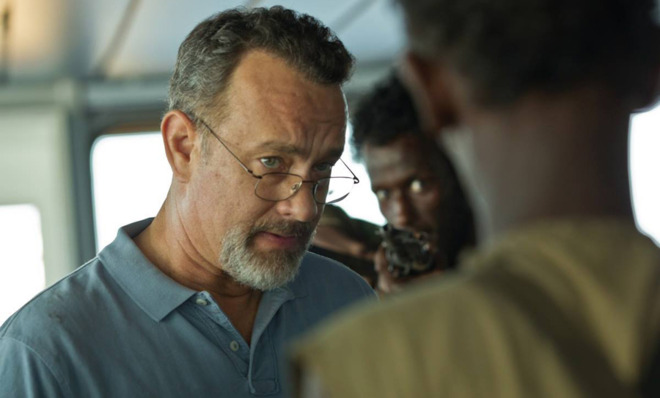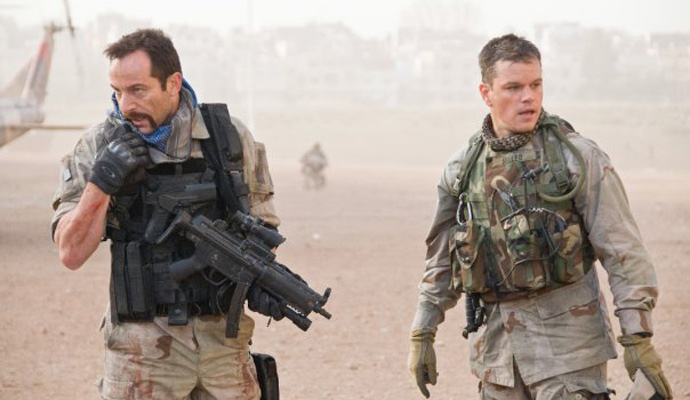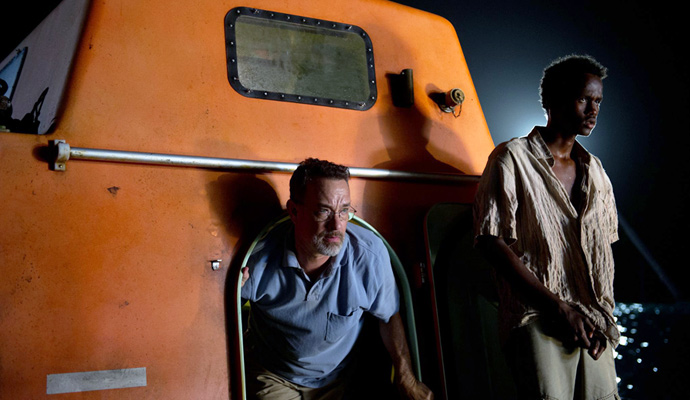Captain Phillips, and the political evolution of Paul Greengrass
The director of The Bourne Supremacy might have made the perfect film for the Obama era


A free daily email with the biggest news stories of the day – and the best features from TheWeek.com
You are now subscribed
Your newsletter sign-up was successful
The first half of Captain Phillips, which enters the award season as an underdog to win an Oscar for Best Picture, is set on the Maersk Alabama, a massive container ship that is raided by a gang of Somali pirates off the Horn of Africa. The ship is like a floating fortress, so big that the pirates scampering up its flank and prowling its decks look no larger than ants. But this is a film by Paul Greengrass, which means that inevitably, to invert a famous line from another movie about the perils of the open sea, we're going to need a smaller boat.
As the director of The Bourne Supremacy and The Bourne Ultimatum, Greengrass established himself as a master of capturing hand-to-hand combat in enclosed spaces. Using a hand-held camera and frenetic editing, his films hurl the viewer amidst the combatants, which makes for thrilling viewing if you've ever wondered what it it's like to be beaten up with a rolled-up magazine. But in his other movies — most notably United 93, Green Zone, and Captain Phillips — Greengrass' preference for claustrophobic conflict represents something much deeper: A clash of civilizations on the most intimate scale.
The three films constitute a loose trilogy examining American power in the 9/11 era, with each deploying Greengrass' signature mix of documentary and cinematic license to take on a different episode in recent history. United 93 (2006) is about 9/11 itself, blending the spectacularly violent events of that day with an imagined rendering of what happened on the plane that crashed in rural Pennsylvania. Green Zone (2010) follows a team searching for weapons of mass destruction in post-invasion Iraq, which expands into a broad indictment of the Bush administration's actions before and during the war. Captain Phillips is ostensibly about a more isolated incident in 2009, when Somali pirates briefly took control of the Maersk Alabama before fleeing to a lifeboat with the ship's titular captain, played by Tom Hanks. But despite its humble plot, Captain Phillips is the most far-reaching and sophisticated of the three, marking a high point in Greengrass' evolving take on life in the age of a global superpower.
The Week
Escape your echo chamber. Get the facts behind the news, plus analysis from multiple perspectives.

Sign up for The Week's Free Newsletters
From our morning news briefing to a weekly Good News Newsletter, get the best of The Week delivered directly to your inbox.
From our morning news briefing to a weekly Good News Newsletter, get the best of The Week delivered directly to your inbox.

Indeed, for a movie that tackles one of the great catastrophes of American history, whose roots at least go as far back as the 1980s and whose repercussions continue to be felt today, United 93 is conspicuous for its microscopic approach. The movie proceeds in close to real time, lavishing attention on the iterative succession of events — security, boarding, safety demonstration, delay, takeoff, drinks cart — that precede the hijacking. The world outside the plane is a bunch of air traffic control rooms and a military command center, and the world outside those spaces is depicted on a radar screen. The first plane crashing into the World Trade Center is not a slow-motion extravaganza of fire and rippling glass; it is a green dot that abruptly disappears. Greengrass mostly relies on news footage to show the second plane crashing into the South Tower, and for the rest of the movie the twin buildings smoke grimly in the background on giant monitors.
United 93 provides no context to these events, as if its sole purpose is to recreate the visceral impact of these bolts from the blue. As the chaos and carnage mount, bewilderment and grief sweep across the faces of the air traffic controllers and military personnel. On the plane itself, a pleasant early morning flight veers abruptly into nightmare, as the four hijackers use box cutters to kill the pilots and commandeer the plane. The word "terrorism" is not uttered once, let alone the words "Osama bin Laden," even though we know that suspicion fell on the al Qaeda leader almost immediately. The hijackers are ultimately unknowable entities; besides establishing that they're religiously devout, Greengrass declines to offer any explanation for how these men could murder so eagerly and with no remorse whatsoever.
On one level, this immediacy makes for a devastating film, capturing the senseless terror of a world suddenly flipped on its head. At the beginning of the movie, the passengers are mere civilians; a mere 90 minutes later, they are amassing crude weapons as they plan an assault to take back control of the plane, at which point their rage, fear, and desperation are as palpable as the feverish sweat on their brows. ("I'm going to break his arm," one amped-up passenger says of a hijacker.) And when the film ends in a bone-crunching welter of blood and limbs, Greengrass' method transcends a slick fight-scene aesthetic to accomplish an effect that is extremely upsetting.
On another level, immediacy makes for a woefully incomplete picture. In a 2006 essay in The New York Review of Books that discusses United 93 and Oliver Stone's World Trade Center, Daniel Mendelsohn wrote, "There’s no question that [9/11] was also a story of heroism and bravery; but the fact that people were forced to be so heroic that day was the result of a vast and complicated network of political, social, and historical forces which, five years later, it is irresponsible not to want to acknowledge. The pretty much exclusive emphasis thus far on the 'good' — the heroism and the bravery of ordinary Americans — in these entertainments is noteworthy, because it reminds you of the unwillingness to grapple with and acknowledge the larger issues, the larger causes and effects that culminated in what happened on September 11, which has characterized much of the national response to this pivotal trauma."
A free daily email with the biggest news stories of the day – and the best features from TheWeek.com
Nobody can accuse Greengrass of neglecting cause and effect in Green Zone. The movie attempts to pack in the U.S. government's myriad failures in Iraq, which prove to be far too many for a single movie to bear. While the movie's plot centers on a wild, fictional tale about a former Baathist general who had warned the U.S. that Saddam Hussein's WMD program was non-existent, Green Zone is the most straightforward and least successful of the three films, dutifully rehashing a story of deception and criminal incompetence that is all too familiar. The film ticks off the requisite boxes: an unreliable intelligence source referred to as "Magellan," as opposed to "Curveball"; a Judith Miller-type amanuensis who proliferates the message of a government raring to go to war; an oily Ahmed Chalabi-like figure who expects to be greeted with rose petals when he returns to Iraq; a character who manages to be Paul Wolfowitz, Paul Bremer, and Donald Rumsfeld all at once; the dismantling of the Iraqi army, and the subsequent anarchy on Iraq's streets; and a nod to the abuses at Abu Ghraib.

"The reasons we go to war always matter," says Chief Warrant Officer Roy Miller (Matt Damon), an oasis of good old-fashioned American decency amidst so much fecklessness, hubris, and spin. But even if Green Zone's sermonizing is justified, it never amounts to much that is particularly insightful or original. The most notable aspect of the film is how members of the American security apparatus are portrayed. If they are battered and vulnerable in United 93, they are cartoonish villains in Green Zone, a contrast that neatly expresses, fairly or not, the damage the Bush administration inflicted on America's reputation in the span of a few years.
Captain Phillips brings us to the beginning of Obama's presidency, which in terms of foreign policy has been marked by a deep ambivalence about America's role on the global stage. On the one hand, the U.S. has largely abandoned a strategy of wholesale military intervention; on the other, it has stepped up its use of drone strikes and expanded the surveillance state, allowing the U.S. to reach across borders with chilling precision. In the case of Egypt, the U.S. has thrown its support behind a revolution and its counterrevolution, ending up caught between a classically liberal policy and a realpolitik approach. The confusion has spread to other areas in the region, where the U.S. has helped overthrow a dictator in Libya, but declined to do the same in Syria.
In contrast with Bush's Manichaean view of the world, it is a record that reflects Obama's personal predilection for shades of gray — or what his detractors would call a fatal lack of conviction and a squeamishness about using military force. Either way, it makes for a somewhat schizophrenic policy, simultaneously decisive and hesitant, careful and spontaneous, brutal and humane. To put it differently: While both presidents would say America is a force for good in the world, only one would attach some provisos.
Captain Phillips turns out to be a very effective vehicle for examining these mixed feelings about our global hegemon, starting with a highly sympathetic portrait of the four Somali pirates who take Phillips hostage. First-time actor Barkhad Abdi has been rightly praised for his convincing performance as gang leader Abduwali Muse, his skeletal face alternating between a frightening mask of unchecked aggression and a sullen rictus of pain and regret. The Jekyll-and-Hyde act captures how Muse and his comrades are of two minds when it comes to America, a fraught combination of loathing and longing that will be familiar to anyone who has spent time in the developing world.
"They have no respect for us," one hijacker screams as the full might of the U.S. Navy closes in on the lifeboat, an orange capsule that in comparison to the USS Bainbridge is little more than a buoy. But while this smoldering sense of inferiority can erupt with volcanic violence, it also can be assuaged with even the slightest recognition. "They know who we are," another hijacker exclaims in astonished delight, like a tween called out by Justin Bieber, after the chief U.S. hostage negotiator names each of the pirates and identifies where they come from. And in one telling scene, Muse tells Phillips that his big dream is to move to New York and buy a car, a moment that is all the more touching since it's clear that this simple fantasy has no chance of coming true.
This is the pitiable, tortured mentality that can come from living in an impoverished nation at the periphery of the world, under the shadow of a globalized economy that, Greengrass suggests, has robbed these erstwhile fishermen of their livelihood and forced them into piracy. "There must be something else you can do besides...taking people hostage," Phillips offers at one point. To which Muse responds, "Maybe in America. Maybe in America."
Further fleshing out the pirates' motivation, it also becomes apparent that they are under pressure from a larger criminal organization back in Somalia. "I got bosses," Muse tells Phillips. "We all got bosses," Phillips responds, a pointed remark that alludes to the larger forces that have brought these two men together.
It would be a stretch to suggest that Muse and his comrades have much in common with the 9/11 hijackers and their crazed ideological ilk; indeed, one of Muse's first lines upon boarding the Maersk Alabama is: "No al Qaeda, no al Qaeda." But Muse's profile certainly matches that of, say, Ajmal Kasab, one of the gunmen who participated in the 2008 terrorist attacks in Mumbai, India. And it is rare and brave for a Western director to at least recognize such men as human.

If America swings from being a bogeyman to a utopian paradise in the mind of the pirates, it represents something more nuanced in Greengrass' eyes. In contrast to United 93, which sees members of the military openly displaying a range of emotions, the avatars of the state in Captain Phillips are as robotic as T-1000s, biting off their sentences as if speech itself would betray too much feeling. In a balletic sequence featuring SEAL Team Six (valorized in Zero Dark Thirty as the squad that killed bin Laden), the soldiers change clothes to reveal perfectly sculpted bodies the size of tanks, accentuating the notion that these men are not heroes so much as deadly instruments of the U.S. government.
However, if Greengrass presents the U.S. as a cold, menacing presence, he wisely steps back from the kind of crude caricatures that undermine Green Zone. The Navy in Captain Phillips is neither good nor evil; indeed, it is assigned no moral value whatsoever, which reflects a more realistic understanding of how foreign policy is conducted, something that was not present when Obama, the commander in chief of the world's largest military, was awarded the Nobel Peace Prize in 2009. No matter how much he sympathizes with the pirates, Greengrass never suggests that the Navy is wrong in assassinating three of the hijackers to rescue Phillips. (Muse is tricked into captivity, and his real-life counterpart is currently in an American jail.) That is the way the world works, and Phillips and Muse both know it.
What Greengrass does suggest is far more disturbing. Before they are executed, the three pirates and Phillips engage in a vicious fight on this tiny boat that is reminiscent of the final scene in United 93: hands clawing throats, fists meeting faces, mouths agape with screams. This is the human cost of the great wheels of power that spin invisibly and rule our lives; Greengrass is not only saying that we are at their mercy, which would be trite, but that we are ensnared into participating, into grasping and scratching and fighting.
At the end of the movie, after Phillips is rescued, he is brought on board the Bainbridge to receive medical attention. He is in a state of shock and rendered virtually speechless, a scene so movingly played by Hanks that I can't imagine it was surpassed by any other performance this year. The reason this scene is so powerful is that his shock is a response both to what has happened to him, and to what he has done with his own hands. "That's not my blood," he stammers at the medic.
This is Paul Greengrass' world, where there a lot of victims but no one is innocent.
Ryu Spaeth is deputy editor at TheWeek.com. Follow him on Twitter.
-
 Nuuk becomes ground zero for Greenland’s diplomatic straits
Nuuk becomes ground zero for Greenland’s diplomatic straitsIN THE SPOTLIGHT A flurry of new consular activity in the remote Danish protectorate shows how important Greenland has become to Europeans’ anxiety about American imperialism
-
 ‘This is something that happens all too often’
‘This is something that happens all too often’Instant Opinion Opinion, comment and editorials of the day
-
 House votes to end Trump’s Canada tariffs
House votes to end Trump’s Canada tariffsSpeed Read Six Republicans joined with Democrats to repeal the president’s tariffs